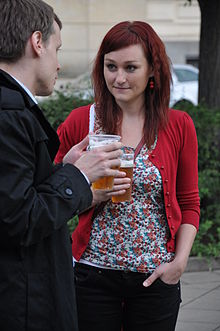Kateřina Tučková
Kateřina Tučková (born October 31, 1980 in Brno ) is a Czech writer , curator and non-fiction author.
Life
Kateřina Tučková spent her childhood and youth in the South Moravian villages of Moutnice and Kuřim . After attending the “Gymnázium Brno, třída Kapitána Jaroše”, she studied art history and Czech philology at the Masaryk University in Brno. She continued her studies in art theory and art history at the Institute for Art History of the Philosophical Faculty of Charles University in Prague, where she received her doctorate in 2014 with the dissertation group RADAR ( Skupina RADAR ). She currently works as a writer and curator . As a curator, she ran the ARSkontakt gallery. Since 2016 she has been the program director of the “Meeting Brno” festival, where current and historical Central European topics are treated and artistically processed.
Tučková took part in the 2015 Year of Reconciliation event. At this event, the city of Brno officially apologized for the inhumane expulsion of the Brno Germans for the first time on the occasion of the 70th anniversary of the end of the war. A lot of women, children and old people died in May 1945. This initiative, which was inspired, among other things, by her novel “The Expulsion of Gerta Schnirch”, was also honored by the German President Joachim Gauck in his speech on the “Day of Homeland” . In 2017 Tučková was awarded the “Freedom, Democracy and Human Rights Prize” for an extraordinary contribution to the reflection of modern history by the Institute for the Study of Totalitarian Regimes.
Works
- Vyhnání Gerty Schnirch ( Gerta. The German Girl , from the Czech by Iris Milde, Klak Verlag, Berlin 2018), host 2009
- The main character of the novel, Gerta Schnirch, a Brno German, had to leave her hometown with her only a few months old daughter on the night of May 30th to 31st, 1945, and most of the Brno Germans - here the elderly, women and children - "Expelled" after the liberation from the city - driven in a guarded trek towards the Austrian border. A painful march with numerous dead, made history as the Brno death march . Gerta Schnirch comes from a bilingual family: the mother, a nationally conscious Czech, dies in 1942, the father, a fanatical German, rapes his own daughter, who becomes pregnant. Gerta survived the "death march" with her daughter, was forced to work in South Moravia and, after receiving her Czechoslovak citizenship again, returned to her hometown, which was now a stranger to her. Regarded by the Czechs as a German, she lived on the fringes of society; the relationship with her own daughter was difficult and tense.
- Žítkovské bohyně ( The Legacy of the Goddesses , German: DVA 2015), host 2012.
- High up between the hills of the White Carpathians , women with extraordinary abilities have always lived. They could heal and help with all sorts of plagues, they could give advice in uncomfortable situations and supposedly also look into the future. They were called goddesses and their skills were passed on from generation to generation. Dora Idesová is one of the last of the family of the goddesses of Schitkowa / Žítková . However, she never learned their art, she studied ethnography and decided to research her ancestors. At the end of the nineties she discovered an operational file of the Czech State Security about an enemy from within - her aunt, the goddess Surmena , in the archive of the Ministry of the Interior in Pardubice . Dora sheds light on the fate of the Schitkow women and is surprised to find that, although not a goddess herself, she too is part of a mysterious tradition.
- Fabrika ( Die Fabrik , not yet translated into German), Host 2014.
- Family history of the textile entrepreneur Johann Heinrich Offermann . Thematizes the industrial city of Brno, the "Austrian Manchester "
Honors
- Jiří Orten Prize 2010
- Magnesia Litera 2010
- Josef Škvorecký Prize 2012
- Magnesia Litera 2013
- 2013 Český Bestseller Prize
literature
- Valentina Kaptayn: Between taboo and trauma. Kateřina Tučková's novel 'Vyhnání Gerty Schnirch' in the context of Czech literature about the expulsion of Germans . ibdem, Stuttgart 2013, ISBN 978-3-8382-0482-6 .
Web links
- Literature by and about Kateřina Tučková in the catalog of the German National Library
- Kateřina Tučková , website
- Gallery Arkontakt website
- Facebook site
- http://www.randomhouse.de/Buch/Das-Vermaechtnis-der-Goettinnen/Kate-ina-Tu-kova/e449331.rhd
- Josef Škvorecký Prize
- Magnesia Litera
- Czechlit
- Martina Winkler: Of goddesses and archive officials. A novel about mythical traditions in the White Carpathians. September 2015, on: Zeitgeschichte-online .
- Meeting Brno Festival [1]
- Host publishing house [2]
Individual evidence
- ↑ https://is.cuni.cz/webapps/zzp/download/140036139
- ↑ https://www.iumeni.cz/katalogy/galerie-a-muzea/arskontakt-g00003/
- ↑ http://meetingbrno.cz/de
- ↑ Speech by Joachim Gauck
- ↑ https://www.ustrcr.cz/o-nas/cena-vaclava-bendy/slavnostni-predani-cen-ustr-za-svobodu-demokracii-a-lidska-prava-2017/
- ↑ Katerina Tuckova: "The Legacy of the Goddesses" - Moravia's magical past . In: Deutschlandfunk Kultur . ( deutschlandfunkkultur.de [accessed on October 16, 2018]).
| personal data | |
|---|---|
| SURNAME | Tučková, Kateřina |
| BRIEF DESCRIPTION | Czech writer |
| DATE OF BIRTH | October 31, 1980 |
| PLACE OF BIRTH | Brno |
